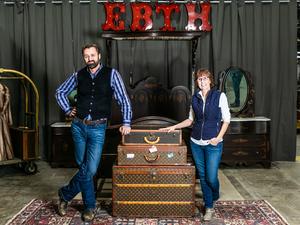
Derek Shewmon and Nick Lobert, former grade school classmates way back in the day, hadn’t seen each other in years when they crossed paths in the hallways of Everything but the House’s Linwood location back in 2015.
Shewmon, a Cincinnati native who had moved back to the Queen City earlier that year, was interviewing for a job at EBTH, a hot Cincinnati-based online estate auction startup, which Lobert had joined a year earlier as employee No. 19. The two, of course, exchanged “hellos,” but it turned out to be more than just a passing encounter.
Fast forward, and Shewmon and Lobert are now heading their own home-centric company, HOMEstretch, and, nearly 24 months in, are finally ready to share it more widely with the world.
HOMEstretch, in many ways, picks up where EBTH leaves off. Its clients, which largely include real estate agents but homeowners as well, may still need help removing trash, donating leftover items, and cleaning up a property after an EBTH sale. That could involve as many as 15 phone calls to various vendors to get quotes and schedule services, whereas with HOMEstretch, Lobert said, that would require just one. In other words, the company is a one-stop shop offering five main service lines: junk removal, painting, carpet and flooring, deep cleaning and light landscaping.
“Through our experience at EBTH, we saw this massive need for what HOMEstretch brought to the table,” Shewmon said.
So far, growth has been solely organic. Lobert’s previous real estate background has been key, Shewmon said, and both men logged startup experience even before joining EBTH. Shewmon, an adjunct professor at the University of Cincinnati, founded LetsMoveDown, a mobile platform that allowed fans at sporting events to upgrade their seats. It was acquired by OneUp Sports for an undisclosed sum believed to be in “the low seven figures” in 2014. Lobert, respectfully, ran his own painting company in Charleston, S.C., and spent three years at Dotloop, which sold to Zillow for $108 million in 2015.
After initially launching in 2019, Shewmon and Lobert are ready to ramp things up in year two. Despite challenges brought on by Covid-19, HOMEstretch grew its top line by 310% in 2020. It’s on track to surpass $1 million in annual revenue this spring. The company now has six employees and recently moved into a larger space on Oaklawn Drive in Oakley.
“It’s been a lot of trial and error, and a lot of manual labor, but we’ve learned our secret sauce,” Shewmon said. “All the growth metrics have been going in the right direction. At least for us, the most exciting thing about HOMEstretch is not a lot of people know about us, and we’ve had pretty good success with just a handful of referral partners and consumers. The possibility of getting this out to more people is tremendously exciting and something we see as a big opportunity in 2021.”


Shewmon and Lobert have several indicators of success this year: In 2020, HOMEstretch averaged about 17 projects a month, a number Shewmon wants to double, while also increasing the average service fee per job.
The company is just now starting to pull together metrics that show its overall benefit: How much faster homes are selling, for example, with new carpet and paint, and what kind of return-on-investment that means for the client. HOMEstretch done work all over the Tri-State, from Blue Ash and Montgomery, to Hyde Park and Oakley, and West Chester and Mason.
“What sells a home is price, condition and location, but the younger generation – and I would consider myself in the younger generation – they want the houses done,” Lobert said. “They don’t want to walk in and see wallpaper and pink carpet and pink toilets. The houses still needs to be prepped and look clean, and when those houses do, they’re selling in under five days.”
So far, the two are bootstrapping the company and have no plans to chase venture capital any time soon. EBTH has had its own tumultuous run since its founding in 2007, and Shewmon and Lobert are adamant about growing the business carefully and adding customers without compromising quality. It’s a fragmented industry overall, Lobert said, and the startup has competitors in every one of its business lines. But it’s a model that could easily lend itself to other cities like Indianapolis or Columbus – when it’s ready.
“We took a lot of great things away from our time at EBTH,” Shewmon said. “I think they do a great job of connecting with customers and solving problems and creating a really good experience in challenging circumstances. There was a lot of fast growth there, and with fast growth, there’s challenges. We’re cognizant about developing HOMEstretch sustainably, where we don’t get too far ahead of ourselves. We do want to grow and become a crown jewel of Cincinnati, but we want to do it the right way.”







